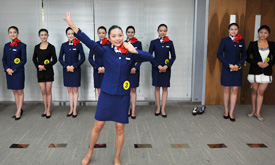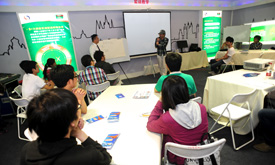|
 |
 |
|
FLYING HIGH: A student from Yunnan Normal University performs traditional dances competing for the stewardess job at Lucky Air, a local airliner based in Kunming, southwest China's Yunnan Province, on May 29 (LIN YIGUANG) |
SHARING KNOWHOW: Students from Jilin University and Changchun Normal University in northeast China's Jilin Province attend a lecture on how to start one's own business on May 25 (LIN HONG) |
"They tend to care a great deal about team coordination or management culture in the workplace," said Tian Rumi, a senior human resources expert from Career International, a consulting company. "They're also more outspoken about their needs or wants, and like to openly negotiate with their employers."
Guo Youmeng is a graduate majoring in digital media at Beijing University of Posts and Telecommunications. She said that she would not mind working long hours, but would prefer her supervisor to explain why she has to, such as the urgency of the task. "I feel greatly motivated in this way," said Guo, who was born in 1990.
"As China's only-child generation, many of these graduates have grown up in an environment of rich material resources. It makes absolute sense that they would choose their jobs based on lifestyle factors such as a flexible work environment," said Xiao Lin, Vice President of Human Resources at Unilever North Asia.
Xiao said that although the post-90s generation faces greater pressure in the competition for jobs, they also attach more emotional needs to their jobs.
Feng Zi'ang, also born in 1990, is a graduate from the Department of Sociology at Shanghai-based Fudan University. In June, she received a job offer from Unilever.
After a one-month internship, Feng decided to become a member of the company. "I like its leisurely and friendly working environment. My colleagues are nice to me," Feng said.
Post-90s graduates are also more open-minded, a view shared by many of today's companies.
"Sometimes, it feels like the post-90s generation doesn't have much sense of hierarchy. They are very comfortable chatting with their superiors, something that was hardly seen in young employees of earlier generations," said Deloitte China Staffing Director Wang Wenji. "It shows more significantly when they are using new media and online communication tools. They seem more comfortable and relaxed using social networks to ask for help, collect information or express their opinions."
At the workplace, the post-90s generation also seems to show greater confidence. They like to be given the chance to prove themselves and expect recognition of their efforts. They are willing to try out new ideas and believe that they can do anything well if it is worthy of their time.
"But at the same time they are also more prone to feeling frustrated and don't like to listen to their elders preaching at them," Wang said. He believes that it is because their self-evaluations tend to be higher than people's actual evaluations of them.
The post-90s generation has received a lot of negative evaluation, which they have found hard to deny. Unlike former generations who were generally unsure of themselves or their futures when they entered the job market, the post-90s generation tends to lack patience.
Xiao with Unilever said that the post-90s generation should be given more tolerance and understanding. She attributes their lack of patience to the great changes in their growth environment. Staying in the same job for five or 10 years seemed very normal for past graduates. But the current graduates tend to think, "Who knows what will happen in five years' time?"
| 